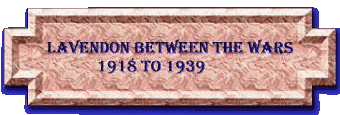


Cicely's father was a builder by trade, but had terrible asthma and so was unable to work. Her mother was a teacher. There were five children in the Ingram family (Cicely's maiden name), and they lived in the 1690 house in Northampton road. The house only had two bedrooms, so Cicely's parents and eldest brother slept in one room and the other four children shared the other. Uncle Fred would sit in the front window of the house and repair shoes. There was a water pump outside the front door which was fed from a well in the yard. They had a big tank built in the yard to collect the rain water they would use for washing etc. Friday night was bath time , the water was collected from the tank, boiled on the stove and the whole family would share the bath, in front of the fire. (Not all at once, of course!). The toilet was at the end of the yard, and the children would take a candle, and hope it did not get blown out, so as to see their way. They always went in twos to the toilet! The sewer cart would come once a week to empty the toilet bucket. The toilet itself was so small that you had to back in, there was no room for manoeuvre. Before the second world war gas was laid on in the village and so the lamp lighter would come around in the evening and light the street lamps. The houses were usually rented from the farmers or the churches in the village. The rates had to be paid twice a year, sometimes christian friends would send money for the rates.
Cicely's dad grew lettuce in the garden and would allow his children to sell them from a basket around the village. If they sold plenty they could each have a penny to spend at the Church fete. The Church had a summer fete every year in the Berry field. There was a marquee, cake stalls, fruit and vegetable stalls. The ladies would serve teas, lemonade and home made ice cream. There was an aunt sally which you could throw wet sponges at, and a rope ladder that you could climb to the top and ring the bell. The children used to go sliding on the ice in the Berry field during the winter. During the war the lammas from Wellingborough zoo were kept in the Berry field. The children would visit the zoo on Sunday school trips occasionally.
Cicely's mother was of the Rainbow family - they ran the village bakery and lived in the Bake House up Castle Road. Cicely's Grandmother was a widow and she had arthritis. She would do the baking and Uncle William would push the baker's cart.
Harley's (the local shop) would sell milk and groceries. The children would take the milk can to the shop and they would fill it. On the way home the children would have a competition to see who could swing the milk can the highest without spilling any. Many children got into trouble when they went home with the can half empty! As money was tight they would have to choose whether to have jam or butter as they could not afford both. On a Monday Lay's, the butcher, would collect a pig, from the farmer, march it through the streets and kill it at the shop, so that the village would have fresh pork. Cicely and her friends would feel really sorry for the pig. Cicely and her siblings were given a half penny on Wednesdays and a penny on Saturdays to spend at the shop. They would buy 2oz of sweets - humbugs or sherbert dabs, which was a bag full of sherbert with either a lollipop or a stick of liquorice.
The nearest doctor was at Turvey, or Olney - Dr Dickinson lived in Olney High Street. On Mondays the doctor would do his round, but the service had to be paid for. The doctor would carry some medicine in his bag. The nearest hospitals were Northampton or Bedford. People that were very old, sick or poor were sent to the work house at Newport Pagnell. The local District Nurse was Mrs Salmon who lived at Cold Brayfield. She would cycle to the villages to care for the sick at home. She also helped to deliver babies.
